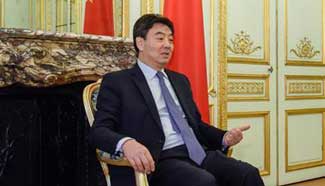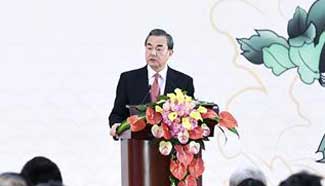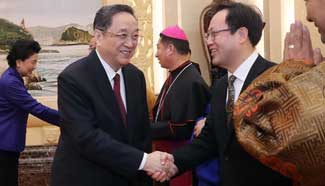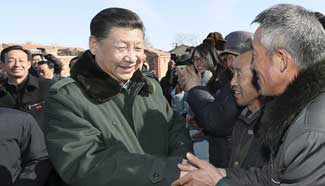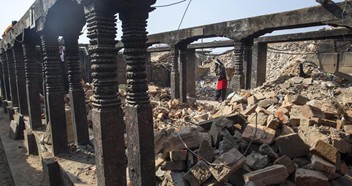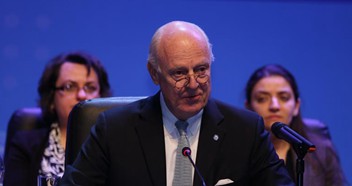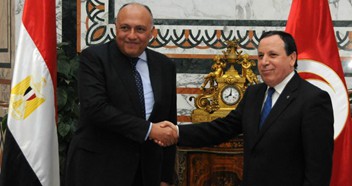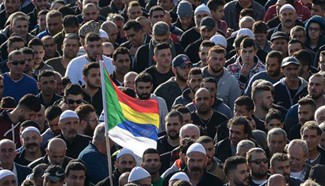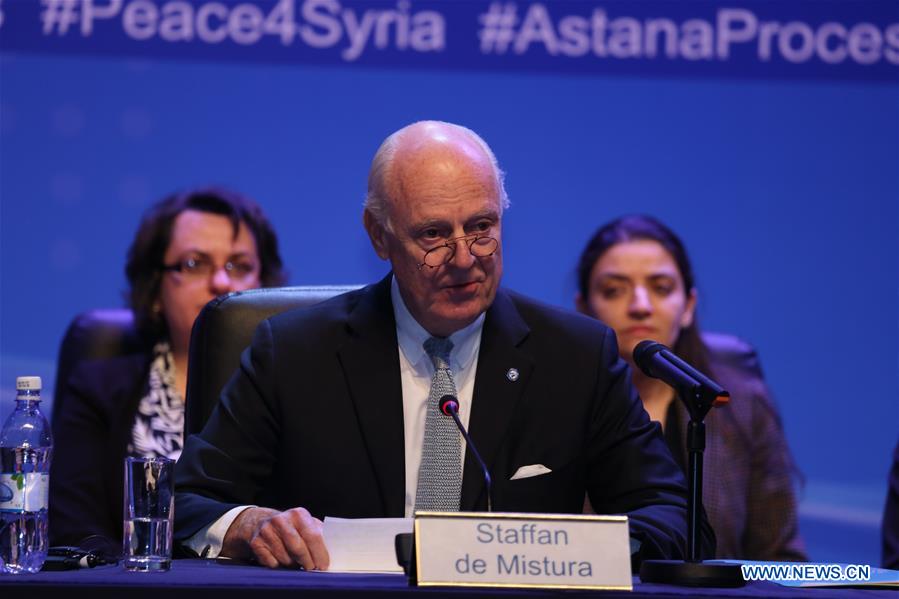
UN Special Envoy for Syria Staffan de Mistura speaks at a press conference after the Syrian talks in Astana, Kazakhstan, Jan. 24, 2017. The Syrian talks in Astana, Kazakhstan, ended on Tuesday, with a final communique backing a one year ceasefire reached recently in Syria, and brought six-year-old foes face to face for the first time. (Xinhua/Kalizhan Ospanov)
DAMASCUS, Jan. 24 (Xinhua) -- The Syrian talks in Astana, Kazakhstan, ended on Tuesday, with a final communique backing a one year ceasefire reached recently in Syria, and brought six-year-old foes face to face for the first time.
Turkey, Russia and Iran, the three sponsors of the two-day Syrian talks, made a joint statement at the end of the meeting, stressing their commitment to the sovereignty, independence, unity and territorial integrity of Syria.
They said the three countries support talks between the Syrian government and armed opposition groups and believe that there is no military solution to the conflict.
The parties reaffirmed their commitment to reach peace and fight against the terror-designated Islamic State (IS) and the al-Qaida-linked Nusra Front and to separate them from other armed opposition groups.
The statement also supports the Syrian opposition's willingness to participate in the next round of negotiations.
The three states highlighted that the international meeting in Astana is an effective platform for a direct dialogue between the Syrian government and opposition.
The Russian, Iranian and Turkish sides have decided "to establish a trilateral mechanism to observe and ensure full compliance with the ceasefire, prevent any provocations and determine all modalities of the ceasefire," according to the statement.
In short, the conference consolidated the ceasefire that was reached on Dec. 29 and implemented on Dec. 30 in Syria. The signatories of the ceasefire were the government and rebel groups, under the auspices of their backers, Russia as the supporter of the Syrian government, and Turkey the long time backer of the rebels.
The Astana talks also stressed on the need to separate the rebel groups, mainly those who attended the conference, from the terror-labeled ones such as Nusra and IS, as both groups have been labeled as terrorist groups by the UN and were excluded from any settlement.
This was a main demand of the Syrian government and this conference has helped in cornering the Nusra and IS, both powerful and enjoy considerable sway in many Syrian areas, mainly the northern city of Raqqa, the de facto capital of IS, and the northwestern province of Idlib, the main stronghold of Nusra.
Russia said Monday that maps were being drawn on the locations of IS and Nusra in Syria for targeting them.
Analysts in Damascus hailed the results of the Astana talks, but said it all relies on the credibility of Turkey and the rebels it has vouched for.
Osama Danura, a Syrian political analyst, said If the Turkish side and the rebels it's backing complied completely with the plan, "it will be an important turning point in the course of resolving the conflict in Syria."
"Now the credibility of Turkey and the rebels who attended the Astana talks is on the line, because it will be under test in the coming days," he said.
He added that the rebels should be truthful in terms of separating themselves from the terror groups.
"The success of this means that an old obstacle, about the overlapping of the rebel groups with the terror-designated ones, is over," Danura said.
He stressed that "It's all about the credibility of Turkey", noting that Ankara has the means to guarantee the commitment of the rebels.
For his part, Hmaidi Abdullah, another analyst, said there are several good aspects in the Astana talks.
He said the talks underscored basic demands such as separating the rebels from the terrorists, and the second is the approach of the three countries to fight the terror groups in Syria.
It's worth mentioning that Turkey and Russia carried out their first joint airstrikes against IS positions earlier this week in Syria, a translation to the agreement between both countries.
Meanwhile, Zahra Fares, a Syrian journalist and political analyst, said Astana talks achieved things that failed to be reached in previous talks between the government and the political opposition.
"I think there were several breakthroughs in the talks in terms of the shape of the talks as for the first time we have seen the rebels and the government sitting face to face, for the first time Turkey was the guarantor and be part of a coalition with Russia and Iran in the face of the terrorist groups," she said.
Fares also pointed out to another new thing in the history of the Syrian talks, saying "it's the first time when we didn't see a main role for the U.S. in these talks," as the U.S. wasn't among those making the conference or reaching the ceasefire as the country was busy with its presidential elections.
Regarding the tension that was sensed in the first session, Fares said "even though there was tension in the talks, but it was normal as those in the meeting are fighting on ground, and it's their first meeting."
Related:
Iran says Astana talks realization of Assad's legitimacy: official
TEHRAN, Jan. 24 (Xinhua) -- A senior Iranian official said here Tuesday that the concluded Syria talks in Kazakh capital of Astana have acknowledged the legitimacy of Syrian President Bashar al-Assad's government, Tasnim news agency reported.
"The Astana meeting demonstrated that all parties, both Turkey and the opposition groups, and even countries not present there (in the talks), have somehow recognized the Syrian government's legitimacy, directly and indirectly," said Ali Akbar Velayati, the senior advisor to Iran's supreme leader.Full story



